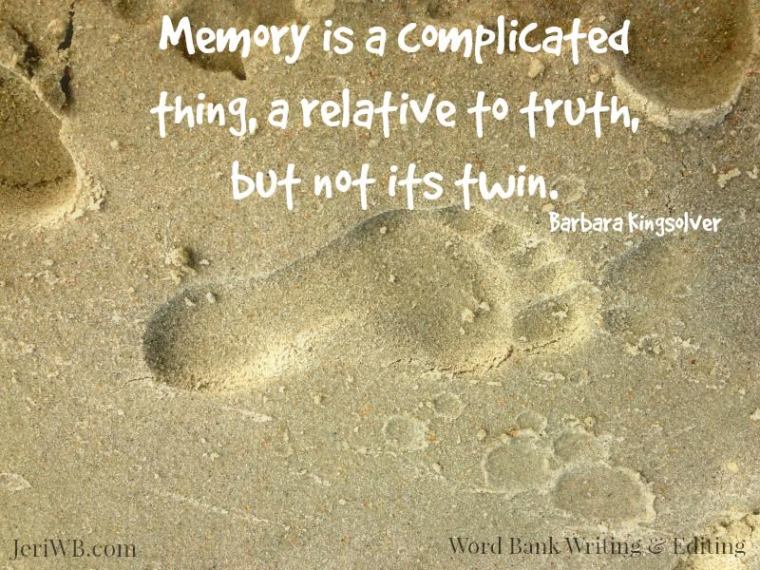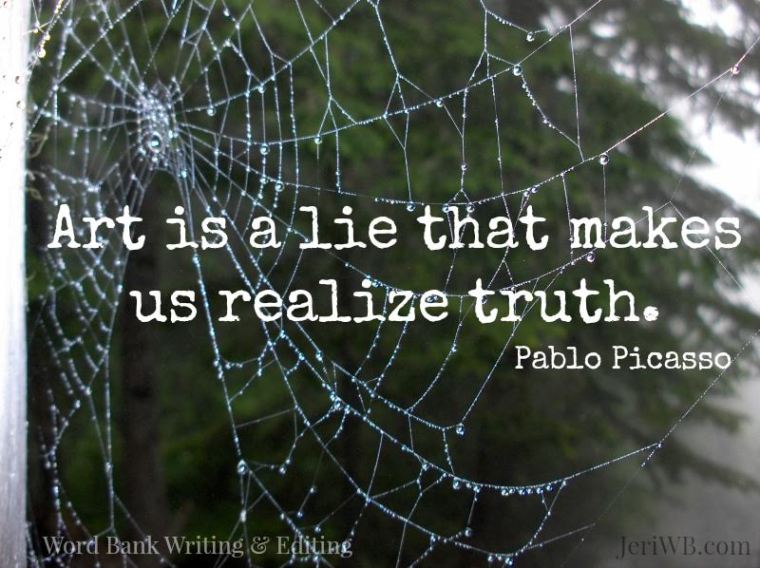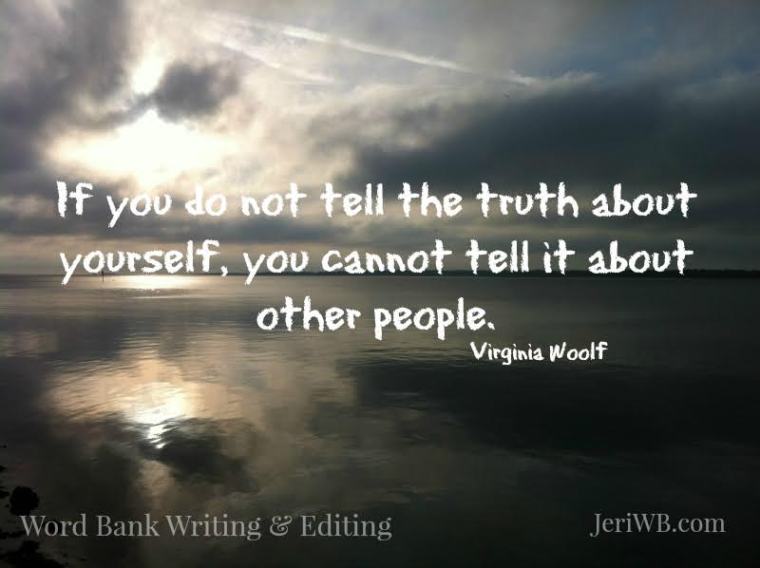Today, I’m excited to introduce on my blog, author/editor Jeri Walker. For those of you who may not be familiar with Jeri, she runs a popular blog, JeriWB – Word Bank and Editing – Make Every Word Count.
Jeri shares helpful articles about creative writing and great editing tips, does book reviews, and hosts author interviews on her blog. And today she has generously offered to make a guest appearance and talk about Creative Nonfiction writing.
Today, Jeri is posting here on the topic: Truth in Creative Nonfiction: What factors should writers consider when crafting reality?
Rendering the truth in creative nonfiction is an art form. Crafting a narrative involves shaping material to tell a real life story using the same literary techniques as fiction, but the story must be factually accurate. Whereas fiction begins in the imagination, creative nonfiction springs from actual events. Any writer who wants to coax a story from life’s seeming chaos has many choices to make.

Changing Memories
Memory is a fickle thing. People often don’t remember things accurately, and time can further erode or shift memories as newer influences come into play. A detail might be remembered inaccurately, but it’s still true to the writer’s memory. This raises the question of whether realizations of erroneous recollections should be alluded to as an equally important part of the narrative. The role of truth in creative nonfiction is also further complicated by how no two people will recall an event the same way.
Telling Truths Subjectively
Everyone experiences reality differently due to the subjective lenses they encounter the world with. A person’s unique backgrounds and beliefs act as a filter used to process events, and lifetimes are spent building frames of reference. Even the words chosen to describe an event shape its perception by an audience. The rendering of subject matter varies depending on the discourse community it’s intended for. It’s necessary to consider the goals and purposes of the particular group the text must reach.

Using Composite Characters
Bringing together the main traits and influence of two or more people into one composite character might be done to protect the so-called innocent or for the sake of supposedly streamlining the number of people in narrative, but doing so brings into question the ethics of doing so. Conflating characters might be done with the intention of strengthening the story, but as it shifts the focus into the imaginary realm.
[bctt tweet=”Once a writer feels compelled to add details that were not part of the story, the motivation for doing so must be questioned.” username=”pokercubster”]
Adding or Subtracting Details
Once a writer feels compelled to add details that were not part of the story, the motivation for doing so must be questioned. If the intent is to use imagined details to arrive at a greater truth, why not just write fiction since it can also communicate larger truths about the world? On the other hand, is it any more acceptable to simply not mention something by leaving it out entirely? Another tendency may be to compress time to speed up the story.

Disclosing Deception
The key is to always remember that truth in creative nonfiction entails being factually accurate. To do the genre justice, the writer must strive to provide an authentic representation of their reality to the best of their ability.
In any case, a nonfiction writer who does employ composite characters or other means of artistically shaping the truth, needs to provide a disclaimer. At the end of the day, has a writer really owned their story and rumbled with it if they have to fictionalize any of it?
What are your thoughts on truth in creative nonfiction?
About Jeri
Truth really is stranger than fiction, and it’s a long damn story. Jeri Walker’s short stories, creative nonfiction, and psychological novels (in progress) show the influence of being raised by a bipolar mother in the eccentric North Idaho mining town of Wallace as well as the trauma of being abandoned by her Jekyll-and-Hyde ex-husband whom she fell in love with while working in Yellowstone National Park.
She and her demanding pets call the Pacific Northwest home. In the continual pursuit of finding herself, Jeri plans to someday live in an RV or a tiny house. She dwells online at Word Bank Writing & Editing, grateful to be charting a course as a freelancer. Connect with her at JeriWB.com or browse her books.
You can check out Jeri’s services Editing Services Here, and her Freelance Writing Services Here
A brief biography of Jeri Walker of JeriWB Word Bank Writing and Editing Services.
Jeri Walker offers freelance writing services and editing services of incomparable quality at affordable rates. Her blog Make Every Word Count features weekly tips on writing, editing, publishing, marketing, and more. She is currently working on a book club discussion guide for authors that will be available to subscribers in early 2017.
Before transitioning to full-time freelancing, she worked on the editorial staff of The Idaho Review, . . .Continue Reading
Source: About Jeri Walker (@JeriWB)



Thank you for a great post. This morning Becca and I were talking about how we could pick a memory from our childhoods, a happy one and try to get all the feelings about it so we could make it into our happy ball which would live inside our heart and help us get over past traumas. This post will help in recalling things which are just out of reach in our minds.
LikeLike
What a fantastic idea Adele. Writing is such a great way to takes our demons out of our heads and let them out on paper. I’m so glad you enjoyed Jeri’s visit. 🙂 ❤
LikeLike
I did indeed 🙂
LikeLike
🙂
LikeLike
Adele, I’ve found my sisters and I have completely different recollections of so many aspects of our family life growing up. They are also 9 and 11 years older than me, which probably helps explain a lot.
LikeLike
I like the “happy ball” idea, Adele. I think that’s great. Hugs.
LikeLike
hugs back Teagan 🙂
LikeLike
Interesting. My sister and I talked about childhood events when she was five and I ten. We recollections didn’t match. Not only could I not believe what she remembered but that it turned out she was right. 😀
LikeLike
That’s what’s fascinating about memory Tess. It is our truth, how ‘we’ remember it. 🙂
LikeLike
Tess, the number of variables that go into making memories truly is astounding. It would be a fun family project to have each member write about the same event and then compare details. I did something similar when teaching high school so students could talk about the nature of “truth” and memories.
LikeLike
Excellent approach concerning creative nonfiction… I particularly enjoyed the excerpts Changing Memories and Telling Truths Subjectively… Once again, writing can tel us so much about the human psyche… and Jeri masters the art of writing—
Great to read this post, Debbie & Jeri: two admirable writers!…
Happy weekend… Aquileana 😀
LikeLike
Thanks for chiming in Aq. And thank you for your lovely compliments too. 🙂 ❤
LikeLike
Aqui, thanks so much. I daresay you definitely belong on the list of admirable writers. Yep, compliments and pats on the back all around 😉
LikeLike
One of the things I learned from writing my memoir is we remember what’s important to us from or unique perspective which is why two children, in the same family, have different memories of the same event. Also, what’s important to one person may not be important to another person. Or even a detail that’s important to one person may not be important to another. So, they may remember everything but that one detail.
LikeLike
Well said Lynette. We remember events that happened to us as our truth, the way we perceived them. 🙂
LikeLike
Lynette, you handled the role of memory well in the draft I read of your memoir. All the research you’ve done on the craft clearly shows in your writing.
LikeLike
Thank you so much Jeri. The memories that
I do have are very vivid. Before I started this blog, I used to collect articles about memoirs and keep them in a three-ring binder. Thank goodness for WordPress!
LikeLike
Thanks for sharing Lynette. ❤
LikeLike
My pleasure as usual Debbie!
LikeLike
🙂
LikeLike
A very interesting post. I particularly liked how Jeri Walker compared truth in non-fiction and fiction.Thanks, Jeri and thanks Debby for this enlightening post. 🙂
LikeLike
Thanks for visiting Carol. I’m glad you found this post interesting. 🙂
LikeLike
Carol, I’m glad I wrote this post because I keep going back and forth on whether I am ultimately more at home writing fiction or nonfiction. CNF is where my writing heart will always truly reside.
LikeLike
Oh, this is so interesting! I don’t write non-fiction, but even with fiction we are using our own experiences and “truths” to create our characters. Great post, Jeri and Debby.
LikeLike
Thank you Diana. I’m glad to know you found it interesting. 🙂
LikeLike
Diana, the fiction I write is always tightly anchored in real-life inspiration. I think it makes some of people I know nervous…
LikeLike
If they’re having a reaction – That’s good!
LikeLike
Thank you so much for reblogging this article Sally. 🙂 xo
LikeLike
Thank you so much Deb for featuring Jeri’s guest post. Hi Jeri, wonderful to meet you! I’m writing a memoir (Deb knows of my rewrite battles!) and you make an excellent point about owning the story. I do believe that we need to be strictly honest in memoir as creative non-fiction otherwise, as you say, why not write fiction instead? Love the Virgina Woolf quote…so very true. And I think living in an RV or tiny house sounds pretty darn good 🙂
LikeLike
Thanks so much Sher, for visiting and leaving comment for Jeri. 🙂 ❤
LikeLike
You’re very welcome Deb, I very much enjoyed reading her post 🙂 ❤ xoxo
LikeLike
Thanks again Sher. ❤
LikeLike
🙂 ❤ xoxo
LikeLike
Sherri, nice to meet you as well. Getting to that place of ownership of one’s story is quite the journey–that moment when a person can put themselves out there and say “take me or leave me.” I thought I was there with my writing so long ago, but life happened BIG TIME, so it’s true that we often have to re-group and own that story as it changes for better or worse. As for living small, right now I’m leaning toward a mini motorhome sometime in the new few years. Gotta get this chapter of my life sorted out first 😉
LikeLike
I wish you nothing but the very best Jeri, for your writing, your mini motorhome, for your every day. Sounds like you’ve had a rough time; I really hope you can soon get back on track as you look to achieve all your dreams and goals. It is quite the journey indeed…sending you light and blessings to guide you along your path 🙂
LikeLike
What a fascinating bio, Jeri. And your thoughts on creative non-fiction–quite helpful. I have a novel that I’ve variously called fiction and creative non-fiction. This helps me to understand it better.
LikeLike
Thanks Jacqui. 🙂
LikeLike
Jacqui, I’m glad you found the post helpful. As for my bio… someday I’ll be able to write that story in detail. It’s a whopper.
LikeLike
I’ve had dozens of philosophical discussions about the truth and what that means to each individual. This post is especially useful in pointing out how memory serves each of us…the brain, by design, tends to discard some of the most nefarious details of any event. Maybe we’re all composite characters in real life, yes????
LikeLike
Maybe so Jacquie. The same incident lived by two different people will always be held differently to each of them because of how they’ve personally experienced the situation. Memoir is our own truth.
LikeLike
Jacquie, that’s a fascinating statement that we all might be composite characters in real life. At times, I look back to some of the most stressful events in my life and have huge gaps. It’s a good things I’ve been keeping an electronic journal since tenth grade. I no longer have the notebooks I filled in middle school and elementary school. Maybe that’s for the best 😉
LikeLike
I’m not a non-fiction writer, but it’s always interesting reading about different types of writing. Truth in creative non-fiction reminds me of A Million Little Pieces by James Frey. He knew the truths, but embellished and distorted them in an effort to make it an interesting story instead of selling it as fiction. Thanks for sharing.
LikeLike
Thanks for visiting Denise and sharing your thoughts. Indeed, James Frey’s book is a good example of creative nonfiction, a bit more over-stepping boundaries for a memoir.
LikeLike
Denise, Frey’s use of distortion and embellishment went beyond what most would allow for in creative nonfiction. In any case, all that controversy was good publicity for his book.
LikeLike
This subject has some interesting sub-texts. Jumping right into my mind is the story of Truman Capote who believed he had created a new genre with his book In Cold Blood which was non-fiction but told in novel form. He recreated conversations and happenings in the lives of the two murderers based on interviews he did with the two men in jail. Only the two perps themselves actually knew exactly what went down, but Capote created scenes that purported to be the truth, even though he really had no idea if what he was writing was the truth. It was his truth.
I have written a novel that has the infamous sand pit murderer Edgar Smith as a character. I call it revisionist history. The transcript of the murder trial in 1957, as well as the statement he gave to the police when he was questioned is a word for word record that provides his truth of the events surrounding the death of a fifteen year old girl. After being released from jail, he got into more serious trouble and wound up admitting that he had lied extensively all along the way. So, the truth of his guilt is now undisputed (even by him). But all through his incarceration on death row for 14 years, there was another truth, his lies, which many people believed, including his benefactor William F. Buckley. Well, Buckley believed the lies for a long time until he didn’t believe them anymore.
LikeLike
That is a fascinating story about Edgar Smith and William F. Buckley. Your book sounds riveting. And I wholeheartedly agree with what you said about Capote, and about it being his truth. Thank you for commenting Larry.
LikeLike
Larry, working on your book was definitely eye-opening experience for me. You took a complicated trial and made it understandable to the reader while also layering Marcella’s story on top of that. It was a great way to explore Smith’s psychology.
LikeLike
Hi Jeri– Without getting too far afield on the subject of mixing fiction and non-fiction in a single novel, a fairly large number of readers of the story are intrigued enough by the premise of mixing fact and fiction to put the book on their shelf, and read it— but almost one in five have a problem accepting that it could actually happen.
LikeLike
Combining people (to protect the innocent) and embellishing your life’s story is the currency of authors who write their memoirs. Does a memoir have to be an exact telling of the truth or is it OK for the author to tell most of the truth but remember that a book is also meant to entertain. Not easy questions to answer
LikeLike
Hi Jeannette, thanks for chiming in. I believe memoir should be truth, truth as the writer remembers it, not to embellish. As far as changing names, and or some locations, shouldn’t hinder the truth of the story, merely used to protect people who don’t wish to be exploited, and authors from potential lawsuits. If the story is written well, there should be no need to embellish with untruths.
LikeLike
Jeannette, I agree with D.G. on this one. A story true story written well enough shouldn’t need embellishment. I’m not for creating composite characters either. Changing names and withholding or conveying details about a certain person should be done with tact no matter what, even if the details being divulged are less than flattering. It’s an author’s right to portray a person as they see them and have experienced them. If and when I do write about my ex-husband, I will change his name. Even though they may not be flattering details I will tell about him, it’s my story and my truth. Not his.
LikeLike
Great response Jeri, thank you. I can say from a memoir writer’s POV, that writing unpleasant things about people is difficult. It’s not only painful to remember incidents, but there is always an underlying fear that the person will retaliate in a legal matter.
I was faced with that dilemma in my book Conflicted Hearts, when I chose to delete a whole chapter on a tremendously abusive relationship I endured for 7 years. I was petrified he’d find me again. Instead of telling that chapter and having to create a whole new scenario, I chose to keep it short, change his name and occupation, and just make a point without elaborating. Due to the time frame in that part of my life, anybody who knew me would have known who he was.
It takes a sort of bravery to write in memoir. And like Anne Lamott says, “If people wanted you to write warmly about them, they should have behaved better.”
LikeLike
Jeri and DG, I agree with all you’re saying. DG — I understand your reluctance to write at length about that relationship. But it took up 7 years of your life so is it honest to sort of bury it? Mind you, I’m not making a judgment call here, but playing devil’s advocate. Bill Clinton had several affairs and it’s been a long time since I read his autobiography, but I don’t remember his discussing them. Was it honest not to mention them (not by name, of course). Thanks for your post — it’s stimulated a lot of good discussion.
LikeLike
Thanks for your feedback Jeannette. I don’t think my decision to bury that chapter was dishonest, as I had nothing to lie about. I felt compelled to talk about it in mention as it was a part of my life that I endured as a result of bad decision, not following my gut instinct, and not familiar with manic depressive disorder, thinking I could fix everyone.
The fact that I went through years of being stalked and threatened, and tried to disappear off his radar, had me fearing he’d come across my book and know it was him in the book. I also felt that the relationship was another story in itself. My memoir was about growing up under the power of a narcissistic mother, and how it affected my life and decisions I made through life as a result of my upbringing. That chapter wasn’t the theme in my life, although a scary time it was.
LikeLike
What an interesting conversation this is. I agree that memoirs should not be embellished with fiction if they are it is no longer memoirs. I have noticed with memory, that my kids may remember and interpret a particular event and it is very different from my memory of the event. They can only interpret that event within the realm of their understanding of life at the stage they were at.
Thanks Kaye and Jeri for stimulating our thoughts on creative non fiction, I am going to visit Jeri’s sites. Oh I love your quote Kaye “If people wanted you to write warmly about them, they should have behaved better.”
LikeLike
Thanks so much for visiting and sharing Kathleen. You will certainly enjoy Jeri’s pages and writing. And I’m sorry but I can’t take credit for that quote, it’s a beauty by Anne Lamott. 🙂
LikeLike
My memory is like goldfish bad. Possibly because I try to do too much and hold too much in my head. I think there would be a LOT of fictionalisation if I ever wrote a memoir!! lol. Fascinating post
LikeLike
Thanks Sach. A memoir on you would surely be fascinating, all vocabulary use included. LOL xoxo
LikeLike
lol, I am so guna do a youtube/podcast soon and I’m wondering just how authentic is ok!! LOLLLLLLL
LikeLike
Lol, now that I want to see! LOL 🙂 🙂
LikeLike
Hi Jeri, that was a really thought provoking post. I had pondered much of what you covered before as I read nonfiction… whose truth is this? Wouldn’t others in the story have seen things differently than the other? How much can the author change a character or omit events and still have it be a true story? I think you gave some great insight into the subject.
LikeLike